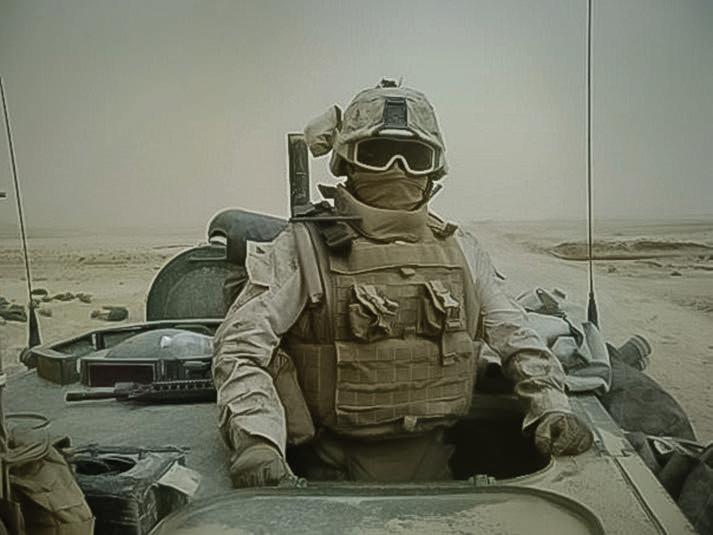
4 minute read
Bridging Transitions

Above Photo: Hopi veteran Cheston Dalangyama, pictured in Northern Iraqi during Operation Iraqi Freedom in 2009. (Photo courtesy of Cheston Dalangyawma.)
Advertisement
This is one of the 11 Marine Corps and track down dangerous fugitives who leadership principles that veteran, flee to reservations,” he said. “Non-Native Criminology major, and former law agents don’t have that rapport with the enforcement officer Cheston Dalangyawma reservation or know the local customs learned during his five years of active-duty and beliefs. I feel that being Native might service in the United States Marine Corps, make the connection a lot easier as far as and is one that he implements everyday. breaking any barriers that may make people
“To me, this principle means to have unwilling to speak.” self awareness, to recognize my strengths His college journey isn’t that of a and weaknesses,” “traditional” pathway: Dalangyawma (Hopi) “Know Yourself a transfer student from said, “and to work Winslow’s Northland on my weaknesses and Seek Self Pioneer College who to become a well rounded person Improvement.” had a 10-year gap between his studies, and father mentally, Dalangyawma’s higher physically, emotionally, professionally.” education actually began while still in high
From the Village of Hotevilla on the Hopi school. Dual enrollment courses propelled reservation, Dalangyawma, 30, is one of him ahead of his peers where by the time the 105 self-identified Indigenous Military he graduated, he was six credits away from Affiliated Students currently enrolled at receiving an associate degree in welding. ASU*, where he is applying this principle Accepted into ASU’s engineering program into his studies to strive toward his dream shortly after high school graduation, job as a special agent with the FBI or U.S. Dalangyawma had to reconsider college Marshals Service after graduation. once he saw the costs.
“Special agents investigate major crimes “I was accepted and was offered multiple

scholarships,” he said, “but I felt that it wasn’t enough. I didn’t want to put the burden on my parents to pay for my education, so at 17, I decided to enlist into the United States Marine Corps and have the military pay for my education.”
At 18, Dalangyawma began his military service which led him all over the world. He was stationed for two and a half years at the California Marine Corps base Twentynine Palms where he was assigned to the 3rd Light Armored Reconnaissance Battalion. He was deployed to Iraq twice, in October 2007 and April 2009. Dalangyawma then left the Middle East when he requested to be transferred to Okinawa, where he served with the 3rd Maintenance Battalion for a year and a half.
While stationed at Okinawa, he tried completing his degree again but was unable to pass. “Being an armorer, I had to work long hours ensuring weapons were functional for field training exercises, safeguarding equipment valued over $1 million, and training of junior Marines in operating an armory,” he said. “This took a lot of time from my studying and it hurt my grades, so I didn’t do too well.”
Following a year in the USMC Reserves where he was assigned to 4th Tank Battalion, Alpha Company in Camp Pendleton, California, Dalangyawma attained the rank of sergeant when he was honorably discharged from service. Upon returning home to the Hopi reservation, Dalangyawma worked as an Indian Health Services security officer and a federal police officer for three years.
“At first I didn’t want to do anything with law enforcement,” he said, “On the reservation a lot of people, including myself, complained about the law enforcement and their response time. However, I decided that I should help fix the problem instead of complaining.”
Higher education knocked on Dalangyawma’s door once again when he was notified that his Post-9/11 G.I. Bill was about to expire, leading him to re-apply at ASU in the School of Criminology and Criminal Justice where he is currently in his third year. Just as Dalangyawma has given back through his military and law enforcement service, he strives to continue giving back as a college student by mentoring the youth as a SPARKS (Students Providing Awareness Resources and Knowledge to Start College) ambassador. Through SPARKS, Dalangyawma shares his life story and the challenges he encounters as an Indigenous student balancing family, school, work, and traditional responsibilities.
One key message he often imparts to the youth in his SPARKS speeches is: college can wait after high school.
“Just know what you want to pursue,” Dalangyawma said. “I tell students that it’s okay to gain real life experience (through) the workforce or military if they don’t feel ready to go straight to a university. You can always explore different options and you might get a more solid idea. Life never goes according to plan and one needs to have more than one backup plan. Adapt and overcome.”
SPARKS is dedicated to increasing college readiness, awareness and enrollment of K-12 students. For more info, visit: For Military Student Support, visit the Pat Tillman Veterans Center on all five campuses or online at:
eoss.asu.edu/sparks veterans.asu.edu
Dalangyawma, who served as a federal police officer for three years, photographed in front of the Department of Interior in Washington, D.C. during National Police Week 2014 honoring fallen police officers. (Photo courtesy of Cheston Dalangyawma.)







